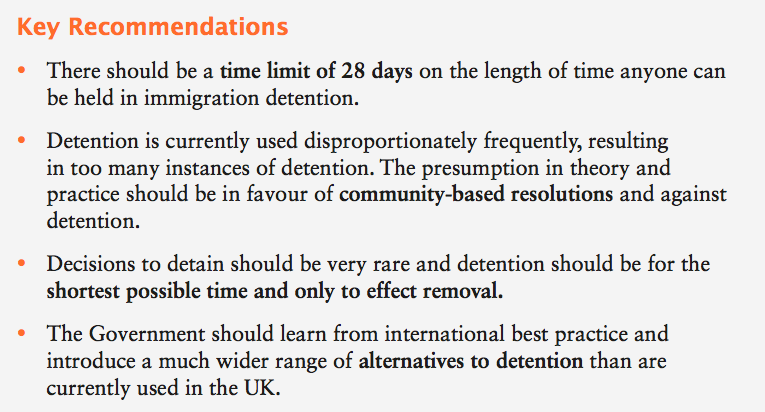Days before the General Election campaign started, the House of Lords debated the detention inquiry report. Here’s our short summary of the debate.
14 April 2015
============================================================
The most substantial Parliamentary Debate yet on the Detention Inquiry Report took place in the House of Lords on 26th March 2015. The occasion, the ‘valedictory’ speech of Lord Lloyd of Berwick, a member of the APPG Detention Inquiry and former Law Lord. The debate was a fitting culmination and tribute to Lord Lloyd’s career, conveying a sense of real momentum towards achieving recommendations in the Inquiry Report.
The debate was notable for the tribute paid to the many NGOs and individuals who have campaigned on the issue of immigration detention, and for the quality and depth of discussion of many of the complex issues arising out of current use of immigration detention.
Disconnect Between Policy and Practice
Baroness Lister of Burtersett, paid tribute to the skilful and committed work of Sarah Teather MP in chairing the Detention Inquiry and again reminded those present of the disastrous effects of indefinite detention, particularly on mental health. She offered an important reminder that a time-limit is an “absolute minimum” but is not enough, what is necessary is “a commitment to making deprivation of liberty for the purposes of immigration control a genuinely last resort, with a presumption in favour of the community-based alternatives practised in countries as diverse as Canada and Sweden”. Baroness Lister reminded the House of the staggering disconnect currently between official policy and what actually happens – guidance that detention should be used sparingly and for the shortest possible period rendered ineffective by work practices and culture.
Further examining this disconnect, Baroness Lister pointed out that in 2013 the UN Committee against Torture urged the UK Government to lower the “evidential threshold” to enable people to legally establish that they are victims of torture and therefore should not be detained. Baroness Lister remonstrated that far from lowering the threshold, the UK stipulates, not only must a woman who is a victim of rape or sexual violence (or other serious physical or psychological violence) show that it was also used as an “instrument of torture”, to avoid immigration detention, she must also have “independent evidence of such torture” – which very often will not exist.
Likewise, Baroness Lister pointed out that the detention of pregnant women routinely occurs in practice and reminded the House that, “The Inquiry heard evidence of pregnant women being treated in a way that caused emotional, psychological and physical distress”.
Baroness Lister’s challenge to the Government was this: “If the Shaw review is to carry credibility, it is crucial that its terms of reference are widened so that it can consider Part 1 of the Inquiry Report”. Part 1 concerns minimising the use of detention.
Community Based Alternatives
Baroness Hamwee reiterated the consensus among speakers in the Lords debate that “The Stephen Shaw review is simply not wide enough”. She powerfully laid out the case for the alternative community-based approaches outlined in the Inquiry report. As Baroness Hamwee cogently pointed out these approaches have excellent compliance rates, are much less expensive and, “Individuals feel that they are given a fair hearing—and if they have to leave, they can make their own arrangements with dignity.”
LGBTI People in Detention
Lord Scriven helpfully focussed on the particular plight of LGBTI asylum detainees, noting the recent Court of Appeal decision in JB Jamaica –v- SSHD and the need for LGBTI asylum detainees to have proper time to gather external evidence necessary to their claim, making such claims particularly unsuited to Detained Fast Track procedures. LGBTI asylum seekers, Lord Scriven points out, continue to suffer particularly horrible abuses in detention centres, despite a review last year by John Vine into LGBTI asylum which the Home Office has taken no action over. In the words of Lord Scriven, “So people go from vulnerability, fear and prejudice to being locked up with vulnerability, fear and prejudice”.
The Weight of Distinguished Opinion – “To None Will We…Deny or Delay…Justice”
It was striking to see so many distinguished speakers in the Lords debate line up to condemn the current system and call for wholesale reform – many whose careers have given them an all too intimate understanding of the issues of immigration detention.
Former Law Lord, Lord Lloyd felt “the judges have let us down”, that detention should be for a maximum of 28 days. Another distinguished former Judge, Lord Woolf, firmly stated “it is clear that some restriction needs to be put on the period of detention”. The former Conservative Home Secretary, Lord Hurd of Westwell, also called for a maximum limit to put an end to “a deeply unsatisfactory state of affairs”. The Lord Bishop of Peterborough put matters eloquently saying, “It is a truism that justice delayed is justice denied”.
Lord Cormack was also one of several speakers to invoke the language of Magna Carta, making the clarion call: “To none will we…deny or delay…justice”, calling on Lord Bates to try and ensure a working party at the beginning of a new Parliament.
Another former Law Lord, Lord Hope of Craighead was “very much in sympathy with the main thrust of the [the Inquiry Report]”, and recalled his experiences as Lord Justice General in Scotland when he was appalled by the large number of asylum seekers being held in detention, in wholly inappropriate conditions, totally abandoned, with nothing to do, nowhere to sit down except their own cells, often unable to speak English, with no idea why they were there and certainly no idea how long they were going to be there. For Lord Hope, “The challenge the report has set for the Minister and the Government means that the way to deal with it has to be a radical rethinking of the whole idea of the use of detention from the very beginning.”
Lord Ramsbotham, previous Chief Inspector or Prisons and IRCs, made no bones about the need for wholesale reform of the immigration system calling on the Home Secretary “to think again about her rejection of the stepping stone of a full review”.
The Earl of Sandwich paid tribute to the excellent Inquiry Report, calling for a 28 day time-limit and community based approaches. Though he too cautioned about the fate which can befall even the best reports, without concerted and sustained action, mindful of the similar recommendations of the Independent Asylum Commission which have largely gone unheeded.
The Earl of Sandwich summed up the opinion of many in saying, “most detained asylum seekers have already endured persecution followed by long, hazardous journeys and, perhaps, torture. Yet these people are victims, not criminals; they are asylum seekers who have already been through an ordeal”. Enumerating some of the recommendations in the Inquiry Report, he called for other checks on detention – such as automatic bail hearings, proper notice of the reasons for detention and effective application of Rule 35.
Labour’s Change of Position
So what of the Government and Official Opposition’s response to the cry for fundamental reform?
Baroness Smith of Basildon reaffirmed Yvette Cooper’s recent announcement.
“Our policy has changed…We have looked at indefinite detention in further detail. We now believe that indefinite detention for people who have committed no crime and have had no review of their case is wrong.”
“We have already said that a Labour Government would end the detention of pregnant women and women who have suffered torture and sexual abuse and have been trafficked.”
“We are not setting a timescale today, but in government we will consult on the appropriate time limits to detention, and look at appropriate safeguards for detention decisions, at best international practice and at existing alternatives that are being used and, in many cases, working well.”
And Lord Bates?
We have still yet to find a reliable way of understanding whether Lord Bates’ remarks are likely to translate into clearly intelligible signs of action. But perhaps encouragingly he did say “as a statement of intent…we do not, as a direction of travel, want to see growth in the numbers of people in the immigration detention centres.”
On Yarl’s Wood, Lord Bates agreed to publish the “improvement plans”.
Lord Bates also said he would find out when the Home Office action plan dealing with issues to do with sexuality would be forthcoming.
Lord Bates committed to writing to Stephen Shaw to ask him to extend the remit of his review to cover, in particular, the detention of pregnant women and people with disabilities. However he carefully limited his remarks on any review of the detention of women who have been subjected to rape and sexual abuse, saying it was “a matter he would include in his letter to Stephen Shaw”.
Unfortunately Lord Bates seemed to make clear that the Detained Fast Track was an aspect of detention policy that the Government is comfortable with, despite widespread concerns and challenges to its legality.
And the Government, like the Labour Opposition, is giving no comfort to foreign nationals where they have completed a sentence for a criminal offence (even a relatively minor one). Both parties want to see these people held in indefinite immigration detention and deported, largely regardless of the nature of the crime or the person’s length of time in and ties to the UK – even though such people often have no ties to the country from which at some remote time in the past they came.
In Conclusion
So all in all, a hugely encouraging debate, with great substance, but also making clear that much has to be delivered in terms of reform, and that there is much we must continue to fight for.
By the Detention Forum Team


